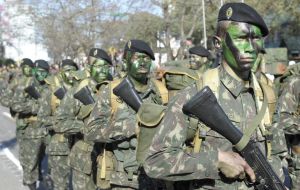MercoPress. South Atlantic News Agency
Unasur defence spending one of the lowest in the world: average 0.91% of GDP
 Unasur 43% expenditure on defense: Brazil’s forces on parade
Unasur 43% expenditure on defense: Brazil’s forces on parade Union of South American Nations (Unasur) member states released a report detailing each country’s military spending. Ministers and diplomats from the twelve nation regional bloc also pledged further military integration, proposing the creation of a Citizen Security Council.
The report, released by the Centre of Strategic Defense Studies (CEED), reveals defense spending in the period 2006–2010. CEED supports the work of the South American Defense Council, a Unasur body which encourages cooperation in regional security matters, transparency in military spending, and provides assistance in peace missions and natural disasters.
The report shows that between 2006-2010 Unasur countries spent 126 billion dollars on defense while accumulated spending increased sharply, from 17.6 billion in 2006 to 33.2 billion in 2010.
Brazil, the most populous country in the continent, headed the list, accounting for 43% of South America’s spending total. Colombia was second, with 17%, and Venezuela third, accounting for 10.7% of the Unasur military expenditure. However Chile stands close with 9%; Argentina, 8.3%; Ecuador, 4.5% and Peru, 4%.
The overall expenditure on defence in the region as percentage of GDP remains stable averaging 0.91%, said CEED. The percentage for the years considered is as follows: 0.90% in 2006; 0.86% in 2007; 0.92% in 2008; 0.95% in 2009 and 0.93% in 2010.
“The evolution of Unasur defence budgets does not register significant variations in the period analyzed and does not enable to establish an armamentism tendency or a militarization of the region”, points out the report. Further more the indicator shows South America is well below other regions of the world.
Taking military budgets individually in 2010 Ecuador was the country which most invested in defence, 2.74% of GDP; followed by Colombia, 1.89%; Surinam, 1.49%; Bolivia, 1.47%; Chile, 1.4%; Guyana, 1.31% and Uruguay, 1.06%. The rest of the countries were below 1%.
This means that the average regional expenditure per person between 2006 and 2010 was 67.4 dollars and the number of soldiers per 1.000 populations was three.
According to the CIA World Fact-book, the US spends around 4% GDP on its military, Colombia 3.4%, and Chile 2.7%.
Ecuadorian Minister of Foreign Affairs Ricardo Patiño commented on the importance for Unasur that member states share details of their defense spending “to establish ties of mutual trust” in the region.
The act of sharing such information is “historic” according to Unasur General Secretary Maria Emma Mejia, who argued that the report breaks both the myths of Latin American militarization and that military spending is detrimental to social development.
“This spending supports the security and safety of South American citizens…because we can attend to citizens with logistics and emergency services. It is a benefit for social peace,” she said.
The report also said that on average 58.7% of military spending was to pay personnel, 23.5% for operations, 17.3% for investment, and 0.5% for research.
At the meeting, held in Quito, Ecuador, representative of the UN General Secretary for Disarmament, Angela Klein, stated that the sharing of military spending information was “an exercise in transparency unseen in any other region of the world and a fundamental step in the construction of regional trust”.
A meeting is scheduled for 5 June in Asuncion, Paraguay, to formalize the report and present its analysis by defence ministers




Top Comments
Disclaimer & comment rules-

-

-

Read all commentsTWIMC
May 14th, 2012 - 04:35 am 0”Representative of the UN General Secretary for Disarmament, Angela Klein, stated that the sharing of military spending information was “an exercise in transparency unseen in any other region of the world and a fundamental step in the construction of regional trust”.
This I call good news!
Telling your allies what you're up to is hardly a sign of anything good or bad, I'm sure Hitler and Mussolini shared such info as well, doesn't mean they guaranteed regional stability or peace, it's a spurious argument.
May 14th, 2012 - 05:09 am 0On May 27, 2011, the South American Defense Council (SADC) presented its Constitutive Treaty at an event in Buenos Aires hosted by Argentine President Cristina Fernández de Kirchner.
May 14th, 2012 - 05:55 am 0The CEED was introduced by Argentina’s defense minister, Arturo Puricelli, to an audience that included the defense ministers of the region and María Emma Mejía. The CEED will depend of the SADC and will be established in Buenos Aires, Argentina. It will be headed by Alfredo Forti, current Secretary for Strategy and Military Affairs of Argentina’s Defense Ministry.
Not really the most impartial or transparent international setup!.
They could not even spell the UN General Secretary for Disarmament's name - it is Angela Kane.
Commenting for this story is now closed.
If you have a Facebook account, become a fan and comment on our Facebook Page!